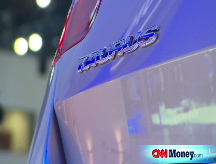GM, UAW reach cost-cutting deal
GM is eliminating the jobs bank, which paid workers near full wages when laid off. Move comes as deadline approaches for GM to prove to government it is viable.
NEW YORK (CNNMoney.com) -- General Motors and the United Auto Workers union have agreed to eliminate a controversial program that kept workers at near full pay even when there was no work for them, the company confirmed Wednesday.
The agreement will eliminate the so-called "jobs bank" as of Monday, Feb. 2. The jobs bank program now provides about 85% of normal pay to about 1,600 UAW members at GM (GM, Fortune 500). Spokesmen for the UAW were not immediately available for comment on the deal.
"We really appreciate our union partners' willingness to work with us as we restructure our business for long-term viability," said the company's statement.
UAW President Ron Gettelfinger had signaled a willingness to work with the companies on the jobs bank issue in early December when he agreed to suspend the program. But that only meant no new UAW members would be joining the jobs bank, according to GM spokeswoman Sherrie Childers Arb.
The elimination of the jobs bank, which critics of the automaker and the union had pointed to as an uncompetitive weight the U.S. automakers could no longer afford to carry, is seen as an important step for the company, as it works to meet the terms of the federal bailout the company received in December.
GM is receiving up to $13.4 billion in loans while Big Three rival Chrysler LLC is getting $4 billion.
As part of the agreement, the two companies are required to reach new union deals by the end of March that would bring their labor costs in line with those of nonunion U.S. auto plants operated by rivals such as Toyota Motor (TM) and Honda Motor (HMC).
According to published reports earlier in the week, the UAW and Chrysler have already reached a similar deal. Neither Chrysler nor the union has confirmed those reports.
"Chrysler continues to work closely with its UAW partners to comply with the terms and conditions outlined in the Government loan agreement," the company said in a statement.
The other member of the Big Three -- Ford Motor (F, Fortune 500) -- continues to have a jobs bank under its deal with the UAW. But that may not last for long. Ford spokesman Mark Truby said the company is in negotiations with the union on its own cost saving efforts.
The jobs bank was originally included in labor contracts in the 1970s at the suggestion of management, which sought to limit union opposition to productivity changes that would eliminate jobs.
Typically, laid-off workers at the three U.S. automakers go into the jobs bank when their unemployment benefits and supplemental pay from the company run out. They remain in the jobs bank until they are offered jobs elsewhere at their company, or until the current labor contract expires.
Workers losing their jobs bank pay will not be without any wage protection, though. Under the deal, the workers who were in the jobs bank will receive a combination of state unemployment benefits and supplemental pay that will provide them with about 72% of normal pay.
Childers Arb said the company and union are still negotiating what will be done when the workers leaving the jobs bank run out of unemployment benefits. ![]()


